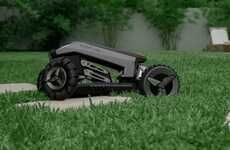The Flytrap Robot effectively mimics the deadly motion of the Venus Flytrap. Although it brings to mind the evil Decepticons from the 'Transformers' franchise, this development will most likely be used for good, not for bad. Essentially, the Flytrap Robot creates a potential fuel source for future robots, allowing them to charge up independently from traditional hookups.
Created by Mohsen Shahinpoor at the University of Maine in Orono, the Flytrap Robot would actually 'digest' insects as a source of electrical power. To do this, it uses artificial muscles made out of polymer membranes coated with gold electrodes. Through creations like the Flytrap Robot, an alternate form of energy can be harnessed. Hopefully these robots don't go rogue.
Tech Plant Eaters
Mohsen Shahinpoor's Flytrap Robot Can Mimic Muscle Function
Trend Themes
1. Bio-inspired Robots - Incorporating natural movements and functions of organisms into robots can result in innovations such as the Flytrap Robot.
2. Self-sustaining Robots - Developing robots that are able to charge and power themselves through alternative energy sources can result in cost-efficient and versatile technology.
3. Alternative Energy Sources - Finding new and innovative ways to harness energy from natural sources such as insects, as seen in the Flytrap Robot, can lead to more sustainable and eco-friendly solutions.
Industry Implications
1. Robotics - The Flytrap Robot is an example of how advancements in robotic technology can lead to practical, eco-friendly solutions for powering machines independently.
2. Energy - Exploring alternative energy sources like the use of insects to power robots, as seen in the Flytrap Robot, can lead to breakthroughs in sustainable energy practices.
3. Biotechnology - Using technologies that take inspiration from nature can lead to disruptive and innovative solutions like the Flytrap Robot that can transform various industries such as energy and robotics.


